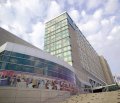
(Photos courtesy of Versico LLC.)

Although the convention center had more than enough capacity and all of the amenities to service the largest of conventions or trade shows, local officials knew that its location would not allow it to reach its full potential. The South Boston Waterfront District has been primarily an industrial section of town and there weren’t enough hotels in the area to accommodate large-scale conventions.
In an effort to attract larger conventions and further enhance the city’s revitalization efforts, plans were made to construct a hotel adjacent to the convention center. The hotel would serve as the headquarters for the newly constructed convention center, offering more private meeting space and adding much needed accommodations for convention attendees. Arrowstreet Inc., a Boston-based architectural firm with over 40 years of experience, was contracted to design the new $200 million hotel, which carries the Starwood Hotels & Resorts’ Westin flag. Arrowstreet has designed a number of hotels in the Boston area, but this one has been the largest, said Fred Warren, a senior technical architect at Arrowstreet who worked closely on the project.
The interesting design of the hotel, which features 23 rooftops on 16 different levels, made the roof system an important part of the overall design. “Quality roofing materials and flashing products are always important in keeping a building dry, but with so many step backs and parapets on this building, those products were especially important,” Warren said. Warren opted for a reflective roofing option and specified a 60-mil VersiWeld TPO roof system, manufactured by Versico Inc., a leading provider of single-ply roof systems.
Featuring an energy-efficient white membrane with heat-weldable seams, VersiWeld roof systems offer an efficient and extremely durable option for low-sloped roofs. “We work almost exclusively with single-ply membranes and we’ve been specifying a lot of TPO because of the many benefits it provides,” Warren said. “Along with the environmental benefits of a reduced heat island effect, TPO offers a cheaper and more cost effective installation than most other single-ply roof systems.”

After negotiating a contract with Suffolk, Greenwood Industries was given the task of installing the VersiWeld membrane to the 150,000 square feet of rooftops on the new hotel. Greenwood is a local roofing company from Worcester, Mass., that is quite familiar with Versico’s full line of roofing systems, including VersiGard EPDM and Versi- Flex PVC, along with the VersiWeld TPO.
“Greenwood has been installing Versico roof systems since we were formed in 1992,” said Matt Brown, chief financial officer at Greenwood Industries. “We have a longstanding relationship with Versico and we are committed to their high-quality roofing products.”
If the 23 separate rooftops weren’t enough to make the roof installation a difficult one, having to work with a number of other contractors o the roof at the same time was. The entire project was scheduled to be complete in two years, so deadlines were tight and the rooftops were crowded.
“Because of the tight deadline, we had to work alongside a number of other contractors at the same time, something we do not always have to deal with,” said Brown. “We worked a lot of overtime to complete this project on time. In fact, our crews put in over 2,000 extra hours, working 10- and 12-hour days plus a large number of Saturdays and even Sundays.”
Greenwood was able to employ a number of different crews that simultaneously worked on separate roofs, keeping the project moving at all times. “It was like doing 23 different jobs all in one place,” said Brown. “There were times when we had 25 roofers working on the project at one time.”
Greenwood began the roof installation by mechanically attaching Versico’s tapered, extruded polystyrene insulation to the building’s concrete deck. According to Warren, polystyrene is a superior insulation with very low water absorbing qualities, making it an excellent choice for meeting Massachusetts’ energy codes.

“This hotel is located in the flight path of Logan International Airport, and the polystyrene insulation helps soften the bothersome noise that guests would otherwise experience without it,” Warren said.
On top of the polystyrene, Greenwood mechanically attached a layer of quarter-inch DensDeck from Georgia-Pacific, adding an additional insulating layer to the hotel’s rooftop. After the insulation and dens deck were laid down, Greenwood went to work mechanically attaching the 60-mil VersiWeld TPO.
Using Versico’s full line of fasteners and fastening plates for all rooftop attachments, Greenwood breezed through the roof installation, finishing the membrane application by heat welding the seams. “Versico’s TPO roof system offers a quick and easy application.
The heat weldable seams eliminate the need for time consuming primers and tapes that are associated with other roofing systems,” Brown said, noting that the largest time-saver was Versico’s complete line of prefabricated accessories, including their pipe boots, curb wraps and inside-outside corners.
“There are over 1,000 penetrations on the hotel roofs. Hand fabricating all of them would have taken forever,” Brown said. “Versico’s prefabricated accessories made the installation much easier, cutting labor costs and increasing our productivity. That’s what helped us finish this job on time.”